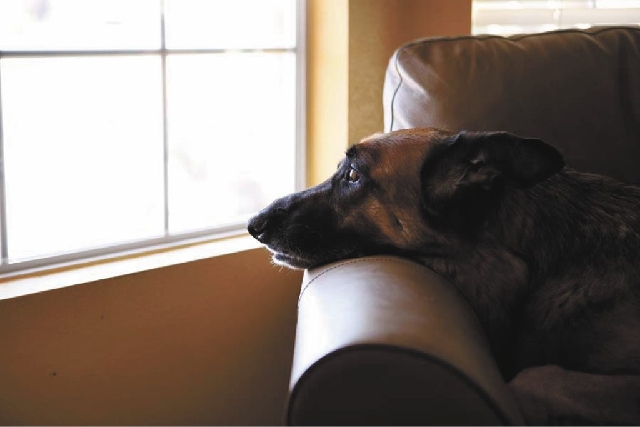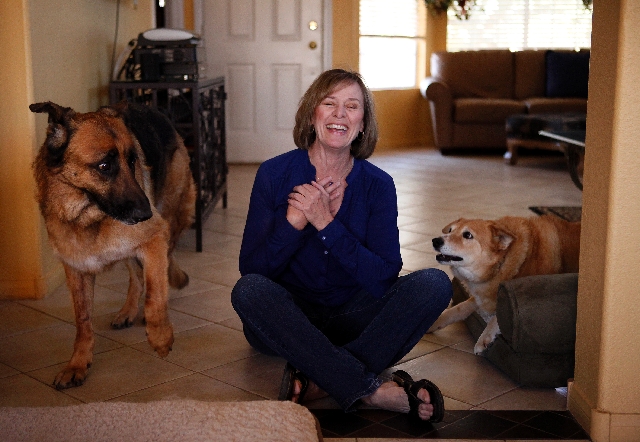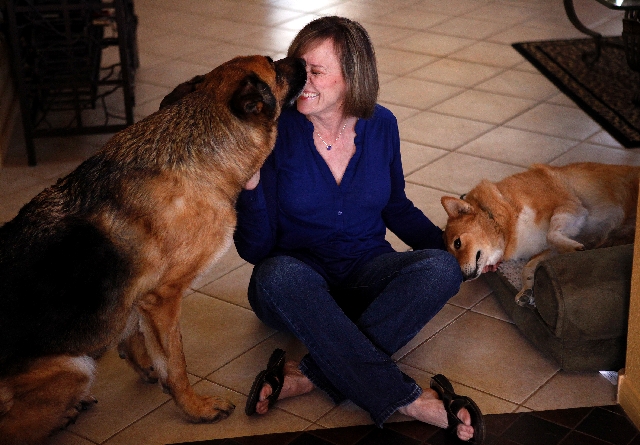Dog owners happy going to extremes loving pets
Dog owner Pam Hall, 55, considers herself a bit extreme when it comes to caring for her two furry friends.
Living alone, she treats her German shepherd Roger and border collie Lily like companions or children rather than pets.
She devotes a lot of time to walking them at least two miles twice a day, every day so they don’t end up on doggie anti-depressants.
Hall invests a good amount of money on dog food and treats — about $250 every month. She says their well-being is worth it, and besides, she deducts it out of their weekly allowance.
“I’m a little extreme at times, but it’s just my personality. I watch their diet, health and social life like I watch my own,” Hall said. “People notice, too. They always compliment my dogs and ask if I can train their kids.”
Extreme? Perhaps. But Hall claims her involvement in her dogs’ lives is linked to an evolved human response used to support parent-child interactions.
“It’s in human nature to bond with dogs because we have complete control over their disposition,” Hall said. “They are really considered family members now, like children.”
Teamed with associate professor Peter Gray and four other researchers, Hall helped publish a University of Nevada, Las Vegas study earlier this month analyzing relationships between humans and dogs.
The group examined the levels of attachment, investment, abuse and anthropomorphism — the application of humanlike traits to dogs — among three categories of dog owners: adoptive owners, relative owners and step-owners.
An adoptive owner acquires a dog on their own terms. An individual is a relative owner if a family member adopts a dog, or a step-owner if their significant other adopts a dog.
These three categories were further compared to relationships humans have with children and stepchildren.
“Many people treat their dogs like young children,” Gray said. “That allowed us to draw parallels with humans from literature and other studies.”
The results determined adoptive owners were more attached and invested in their dogs than step-owners and relative owners. No differences in anthropomorphism and abuse were found.
The researchers acknowledged results might apply to pets other than dogs as long as the pet is able to evoke a similar parenting response. So, feeding a snake or cleaning a fish tank is probably a little different.
They considered including cats in the study but focused on human-dog relationships because they considered them most similar to human-human relationships.
“Cats tend to be less impacted by domestication, so they are less emotionally dependent on humans and less emotionally coddled than dogs,” Gray said. “The American Pet Product Association estimated more than $50 billion was spent on pet products last year, and dogs were among the top of the list. It quantifies how much people care about them.”
Gray admits the relationships between dogs and humans are sometimes complicated and hard to pigeonhole into a relationship category.
“My daughters begged to get a dog, so my wife and I purchased a dog for them,” he said. “Would that make me the adoptive parent because I purchased it? Or am I the relative parent because it was for my daughters? It’s tricky.”
But to Henderson resident Vincent Blanco, 27, the relationship he has with his German shepherd and his girlfriend’s Chihuahua is like night and day.
“I like to rough house with my dog Hooligan and let him play with the other dogs at the park. I’m not worried about him getting hurt,” Blanco said. “But if her Chihuahua ever got hurt under my watch, I honestly think she would dump me. I would never hear the end of it.”
The study collected data of more than 860 pet relationships through surveys at UNLV, local dog parks, pet stores and online, nationwide forums.
“I have to say, I have never seen recruitment like this,” Gray said. “I’ve done parental studies in the past and have never gotten that many responses. It just shows that people love their dogs and are willing to speak about them.”
Hall, a graduate student at UNLV at the time, created the survey by tweaking validated questions from previous Purdue University studies about parent-children relationships to human-dog relationships.
Within the first week, the group had more than 200 responses. They had to cut off the number of participants after about five weeks, because they had more than enough data to analyze.
The survey consisted of 29 questions . Most of the answers were based on a one-to-six scale of agreement with the statement.
“We had to standardize the test somehow, so we asked that people refer to the dog they have lived with the longest,” Gray said. “The study would be too complex otherwise because owners have different histories with each dog they own.”
Some of the questions sparked emotional feedback, like how much money they would be willing to spend to save their dog’s life.
“Many people said they would or already have spent more than $2,500,” Hall said. “Some said they would go into debt. They feel like they have an obligation to take care of their dogs as they would children.”
To some people, however, the line between a biological child and adopted dog is very distinct.
“My family agrees that our dog is a member of our family, but we know who’s who and what’s what,” Gray said. “There are some things I’ll do for my dog, but I have boundaries. There are things I’ll do for my daughters that have no boundaries.”
Diana Wang, 55, of Las Vegas, sees her dogs as new babies. After her two children grew up and moved out of the house, she adopted a pomeranian named Tikki and a coon hound named Dash to keep her occupied.
“I needed to fill the void of not caring for something,” she said. “Dogs are cheaper than my kids ever were and more satisfying than a plant or husband.”
Without any children of her own, Hall said she will never have to come up with college tuition or get on her dogs about completing homework.
Whether a dog is a man’s best friend or furry baby, adoptive dog owners agree they share a special relationship with their dog.
“I wouldn’t give up my biological children for the world, but it is nice not to have to deal with those terrible teenage attitudes anymore,” Wang said. “Instead of coming home to arguments about dishes and going out, I come home to a bunch of wagging tails and slobbery kisses. It really makes your day.”
Contact reporter Caitlyn Belcher at
cbelcher@reviewjournal.com or 702-383-0264.



















